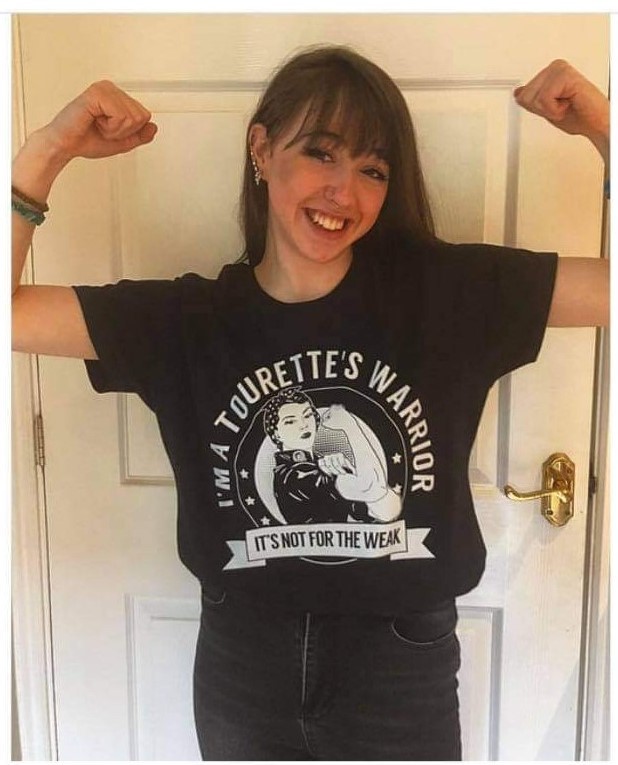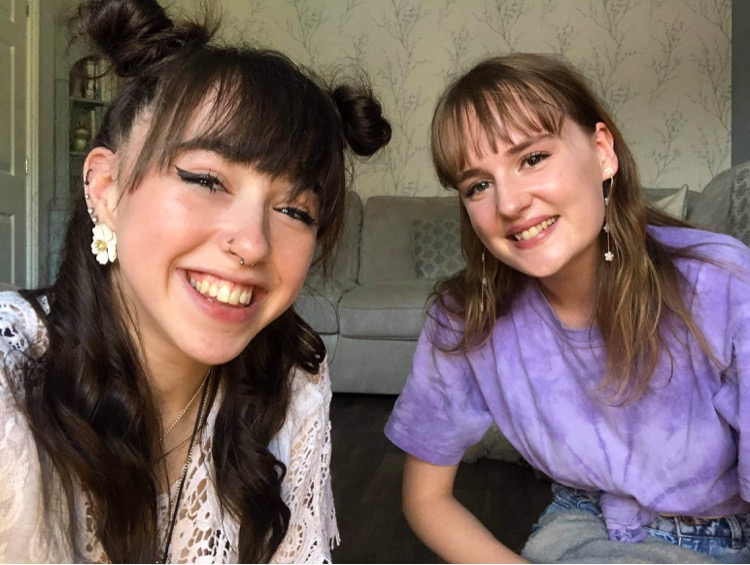
Evie Meg, or This Trippie Hippie, has risen to Tik Tok stardom during the pandemic, now having gathered a following of 13.2 million on TikTok, and 584K on Youtube. She is known for posting videos with a sunny and positive attitude, documenting her life with Tourette’s Syndrome, Functional Neurological Disorder (FND), and mental health issues. Evie has recently announced she is releasing a book, called My Nonidentical Twin: What I’d Like You To Know About Living With Tourette’s. I spoke with Evie about about her book, life with disability, and TikTok fame.
Those are the facts. But this interview is going to be 100% biased! I have known Evie since we were in nursery, before her conditions developed, and she is my oldest friend. Even the word interview feels too formal. Me and Evie jokingly tried out doing a formal interview during our call, and it did not last long. Conversation is a better word, because that’s all this was, a conversation between friends.

When Evie first told me that she had been offered a book deal we were on a snowy, wintery walk. This was before the news was released to the world, and so I had to promise not to tell everyone (which is naturally exactly what I wanted to do). There was a secret to keep. But Evie’s tics make keeping secrets a lot harder. Evie tells me she kept “shouting it out when I was on live streams and stuff.” Similarly, her conditions make writing a book much harder. Whilst writing she can be interrupted by absence seizures, tics hitting the computer keyboard, episodes of paralysis, and muscles locking up. One can only imagine the pain and exhaustion this causes. Evie laughingly tells me she had to take “a lot of naps”.
I asked her how she felt about being so open about the unbelievably difficult and cruel journey I know she has been on. She explains when she’s writing she tries to “rationalise” and think “Ok, so am I going to be okay with people reading this?”, but that ultimately “if it’s going to help people then yeah of course it’s important to put it in there”. Evie says people should “feel some kind of hope” after reading her book. She wants people who have “some sort of disability”, or Tourette’s, or “didn’t do that well in school academically like me”, to know “they can still like achieve really awesome things.” The book also goes into detail about Tourette’s, including “the name of every type of tic, because they all have categories”, so that when readers finish the book they should “have quite a detailed understanding of Tourette’s syndrome”.
Throughout the book, Evie has portrayed her Tourette’s as “this whole other character, we tried to sort of personify it”, because her tics are “not really like me”. She explains Tourette’s as feeling “like being on strings and like you know someone’s pulling at your arms or pulling at your head”. This is the meaning of her book title. Her Tourette’s is her Nonidentical Twin. Evie tells me she was inspired by the film Front of the Class, about a man with Tourette’s who wants to become a teacher and “referred to his tics as his constant companion, which I really liked”. I think of the laughing, creative, caring Evie I knew before her tics developed. This is the same Evie I know today, only now I know her Tourette’s ‘twin’ too.
We start talking about the pros and cons of social media. With internet fame inevitably comes haters and mean comments. Evie says, “I think the worst ones are when they like tell me to kill myself or tell me that I should be dead or something like that, just because I have a disability…or two or three.” It is shocking to hear people being so bullying. Despite all this, Evie tells me adamantly that on social media the “positives just massively outweigh the negatives, like I’m very lucky to have a very lovely fanbase.” She has equally had “people message me saying that I’ve made a difference, and really lovely comments”.

And it is empathy, exactly what haters lack, that Evie’s platform is about. We often talk about being sensitive, and Evie feels “in a way it’s not a bad thing, because it means that we have really good empathy for other people. We can understand what people are feeling, we can sort of try and put ourselves in their shoes”. This is what her TikTok videos, and now her book, are doing. They are teaching people to be more accepting of others, especially those with disabilities.
A finishing note. I decided not to transcribe all the times Evie’s Tourette’s twin shouted “beans” at me, but I felt it should be included somewhere.
Pre-order the book here: https://geni.us/eviemeg
Header image credit: Evie Meg Field

